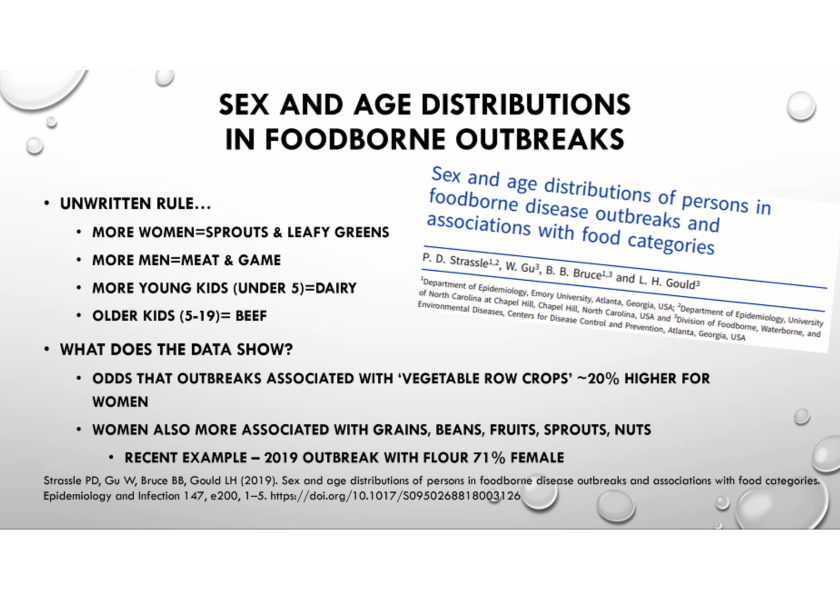CORRECTED: Is epidemiology ‘unwritten rule’ the key to sources of E. coli?

(CORRECTED) As the Food and Drug administration and a myriad of local, state and other federal agencies seek an answer to what’s causing three separate E. coli outbreaks, one likely answer is sprouts or leafy greens, according to demographics of past outbreaks.
There's an “unwritten rule” in epidemiology: if a higher percentage of women are sick (and they tend to be younger) in the outbreak, it’s likely sprouts, leafy greens or other vegetables.
“I looked at the data from the (Centers for disease Control and Prevention), and I said if I was a betting man, I would say that it’s either sprouts or leafy greens, because of the distributions (of cases),” said Kristen Pogreba-Brown, assistant professor of epidemiology at the University of Arizona. “If you look at that, each of the outbreaks is about 67% female and generally, the age is younger, about 21 to 24.”
Pogreba-Brown was one of four speakers during the Produce Marketing Association’s Virtual Town Hall on Nov. 18 that focused on leafy green outbreaks and why they tend to be concentrated on the seasonal transition from California’s Central Coast region to the desert/Yuma, Ariz., and vice versa.
Using demographics as a predictor of possible causes is well-known among epidemiologists, she said, and was the subject of a 2019 study.
The rule, according to researchers, is that outbreaks with higher numbers of these demographics are more likely to be linked to:
Women: sprouts, leafy greens, fruit, row crops;
Men: Meat and wild game;
Children under 5: Dairy
Older children: Beef
In a 2019 outbreak linked to flour, 71% of those who became ill were women, Pogreba-Brown said.
She pointed out that a reason some investigations take longer is that people who are included in an outbreak might not have been interviewed yet. In the three current outbreaks, the latest information available shows that 40 of the 56 ill people have been interviewed.
Tell the facts
Neva Cochran, a nutrition communications specialist, has worked with food industry groups for 15 years to help dispel misinformation, and has consulted for the California Leafy Greens Marketing Agreement for two years, following a 2018 outbreak traced to romaine.
Her advice to companies involved in foodborne illness outbreak: tell the facts and tell them ASAP. She said research shows the brain seeks a narrative that it can easily follow, and that in the absence of information, it will fill in the gaps based on assumptions or past experiences.
“The brain’s not a big fan of ambiguous stories that leave unanswered questions and a big tangle of possibilities,” Cochran said. “So we as humans feel obligated to make up stories and run with them, even if they are wrong and incomplete.”
The lesson, she said, it to tell consumers as much as possible, and ensure them you will update them as more information is known and follow through.
Test plots yield information
Jim Brennan, president of SmartWash Solutions, which is owned by Taylor Farms, discussed preliminary results of testing on two 10-acre plots of organic romaine lettuce.
Segments of the plots were used to research the effects of numerous factors, from using leaf blower to detect how dust could spread pathogens, to animal intrusion and its effects and the cleanliness of harvesting equipment.
Throughout the program, 2,500 samples were taken, and although there were no positives for E. coli O157:H7, there were other strains detected, Brennan said.
Although the results are still being reviewed, and more research is planned, Brennan said initial finding include:
- Pathogens are present in soil, but there’s limited transfer to plant tissue;
- Ag water is still a high-priority candidate;
- Animal intrusion doesn’t seem to be a priority vector; and
- Airborne pressure, with winds blowing pathogens onto crops is a possible source, but appears to be limited as a cause of contamination.
An E. coli vaccine?
Michele Jay-Russell, a research biologist with the University of California-Davis, discussed results of several studies, including longitudinal studies that look at a specific geographic area. One is ongoing in the Yuma area. Another one is planned in California.
With past investigations finding red flags with cattle operations and irrigation water in those areas open to the air, Jay-Russel said there is interest in studying the effects of using a vaccine for E. coli O157:H7 in cattle.
It’s been heavily vetted in the Midwest, but was not successful. However, she said it could be studied in a targeted way with smaller cattle operations near vegetable fields.
Jay-Russell said researchers are working on grants to study the vaccine’s use in California and Arizona.
Note on correction: The article incorrectly said romaine is the likely cause of the outbreaks; Kristen Pogreba-Brown and the study did not specify that item. She said leafy greens or sprouts; the study also focused on other items including fruit. The FDA has not identified a cause of the current outbreaks; this article regards only Pogreba-Brown's comments and the 2019 study.







